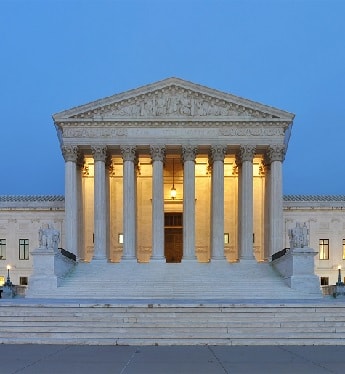Introduction - Court Cases in Black History
There have been many important court cases in black history. Some of the court decisions in these cases, like Brown v. Board of Education of Topeka, lead to great
strides forward in the fight to end discrimination and insure equal rights for African-Americans. Some of the court decisions in these cases, like Plessy v. Ferguson,
have been detrimental to the battle for equal rights.
Click here for a great selection of Amazon.com
books about important court cases in black history.
On this page we list some of these cases along with some interesting facts about each; there are links to pages with more detailed information about many of these cases. This information is written for both kids and adults and includes information on what the case was about, when it took place, and how the decision was important in African-American history.
List of Important Court Cases in Black History
- Dred Scott v. Sanford (1857) - This U.S. Supreme Court case involved Dred Scott, a slave, suing for his freedom based on the fact he had lived in free states for many years before moving back to Missouri, a slave state. The decision against him set a precedent that black people did not have the rights of U.S. citizens.
- The Civil Rights Cases (1883) - Were five similar cases consolidated and brought before the United States Supreme Court. The high court's decision was that the U.S. Congress did not have the authority to prohibit racial discrimination by private individuals and organizations. The decision established that segregation by the private sector, but not the government, was legal.
- Plessy v. Ferguson (1896) - This U.S. Supreme Court case established racial segregation (separate but equal) was legal as long as "facilities were equal"; allowing for discriminatory practices to continue through-out the U.S.
- Gaines v. Canada (1938) - The decision of the U.S. Supreme Court in this case was a major step towards eliminating the separate-but-equal doctrine that the 1896 Plessy v. Ferguson case had set. A black college graduate Lloyd Gaines was denied entrance to the University of Missouri's law school because he was black. Missouri offered to pay for his education at a law school in a different state. The court decided that Missouri would have to build a law school for African-Americans equal to the all white law school or allow Gaines to attend the University of Missouri. This precedent meant governments wishing to maintain separate facilities for blacks and whites would have to do so at a great cost.
- Brown v. Board of Education of Topeka (1954) - One of the most important and famous court decisions in black history. The U.S. Supreme Court in this case reversed the courts earlier "separate but equal" ruling in the Plessy v. Ferguson case in so far as segregation of public schools is a denial of and individual's rights.
- Browder v. Gayle (1956) - In this case Alabama's Middle District Court ruled that racial segregation on buses in Montgomery Alabama was illegal. The U.S. Supreme Court upheld the lower court's decision setting a precedent that racial segregation is illegal not only in busing but in all public areas.
- Loving v. Virginia (1967) - This case involved Richard Loving, a white man and Mildred Loving, a black woman, from Virginia who had been sentenced to jail for one year for marrying each other. The decision of the United States Supreme Court in this case struck down state laws which made inter-racial marriage illegal.
- Swann v. Charlotte-Mecklenburg Board of Education (1971) - The United States Supreme Court ruled that the busing of students to promote integration in public schools was legal.
- Griggs v. Duke Power Co. (1971) - This case was brought by thirteen black employees of the Duke Power Company located in Draper, North Carolina. The Supreme Court ruled that the employees were being discriminated against due to being disqualified for jobs based on test and qualifications that were not needed for the job and had been put in place simply to disqualify them. This was a major step in breaking down barriers to equal employment.
